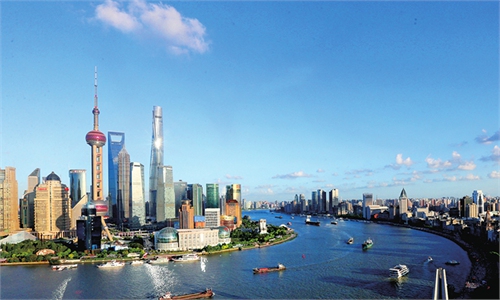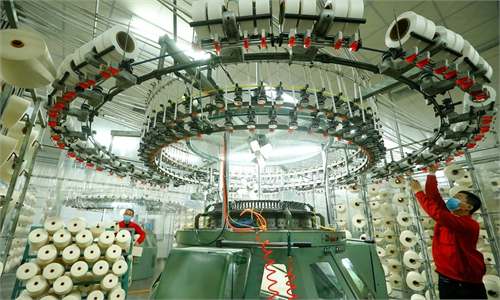
Photo:CFP
As two Chinese megacities - Beijing and Shanghai - are emerging from the shadow of China's worst COVID-19 outbreak since 2020 and bringing normalcy to social and economic activities, it is repellent to see some US media outlets continue to play up the risks of the dynamic zero-COVID strategy to global supply chains.In an article published on Monday entitled "China in danger of exporting fresh inflation turmoil: MLIV Pulse," Bloomberg claimed that China's zero-COVID strategy will likely intensify the world's supply-chain woes and challenge central bankers' efforts to curb inflation. Despite its appearance as a news article, the Bloomberg piece is nothing but an attempt to blame the US' own economic woes on China, provide cover for Washington's total failure against the virus and aid certain US investors' shady moves regarding the Chinese economy.
It is no secret that Wall Street investment banks have recently downgraded their Chinese GDP forecast for 2022, with some apparently over exaggerating the impact of the epidemic and China's response. For instance, JP Morgan recently cut China's GDP growth forecast to -5.4 percent for the second quarter of this year. Clearly, such attempts to hype economic volatility in China are ill-intentioned.
China has been sparing no efforts in accelerating the resumption of production and business to stabilize economic development and tackle supply chain and other specific issues. It should be easy for any fair-minded person to understand that such efforts to stabilize the world's second-largest economy, the world's biggest trading nation and one of the biggest global growth drivers is good for the global economy as a whole.
From that perspective, it is only logical that there are sinister purposes behind the US' smearing campaign against China's dynamic zero-COVID strategy and exaggerating its impact on not only the Chinese economy but also global supply chains. One of such sinister purposes is Washington's intensifying efforts to exclude China's from regional and global supply chains. In this sense, US media outlets like Bloomberg are not only being jealous of China's relative success against COVID-19 but also doing Washington's bid.
The pessimistic views toward China appears to be particularly out of touch with reality and reeks of sour grapes at a time when supply chains are recovering quickly in China and the country has learned valuable lessons in coming up with more targeted epidemic prevention measures with the minimum cost to combat COVID-19. China has apparently brought the most recent outbreak under control with 122 new locally-transmitted COVID-19 cases reported on Monday, and the resumption of production in Shanghai is accelerating, with most businesses expected to reopen this week. Beijing has also allowed certain business resumptions and public activities, as the outbreak in the city eased.
Of course, there is no denying that the recent flare-ups have caused some economic difficulties, but they will only be short-term ones and the fundamentals of China's economy remain strong. As long as economic activity returns to normal in the shortest possible time span, the Chinese supply chain will prove highly resilient with enormous potential.
It is groundless for US and Western media to accuse China of intensifying supply chain problems. In fact, the US itself is facing serious supply chain problems, as reflected in its recent baby formula shortage. They are making a big deal over China's supply chain issues because they don't believe China can overcome the problems they cannot address. Nor do they want to see China accomplish what they are unable to achieve - simultaneously saving lives and securing livelihood in the face of COVID-19.
To a certain extent, the US appears to be more concerned about China's supply chain than it is about its own supply chain. US media outlets have always hyped up China's supply chain crisis, while many American experts and industry insiders suggested moving supply chains out of China or squeeze China out of US domestic supply chains.
By contrast, China has long focused on its own matters. Whenever encountering economic problems, China will go all out to address them. This time will be no exception. Under the current circumstances, accelerating the recovery and development of its supply chain will not only be of great significance to the Chinese economy, but also to China's efforts to further consolidate its position in the global industrial chain and stabilize global supply chains. The US' smearing campaign and geopolitical tricks won't change that.



